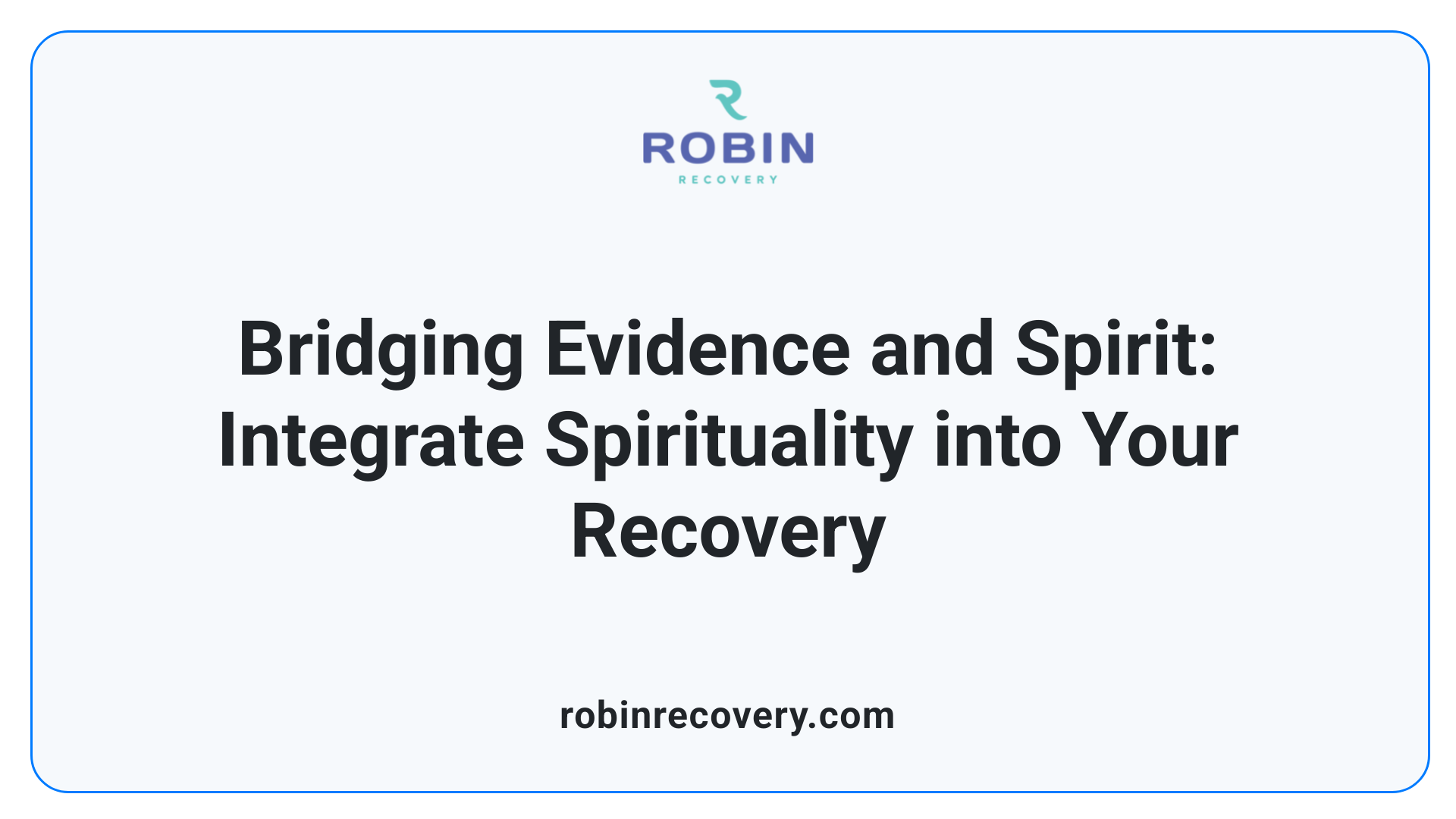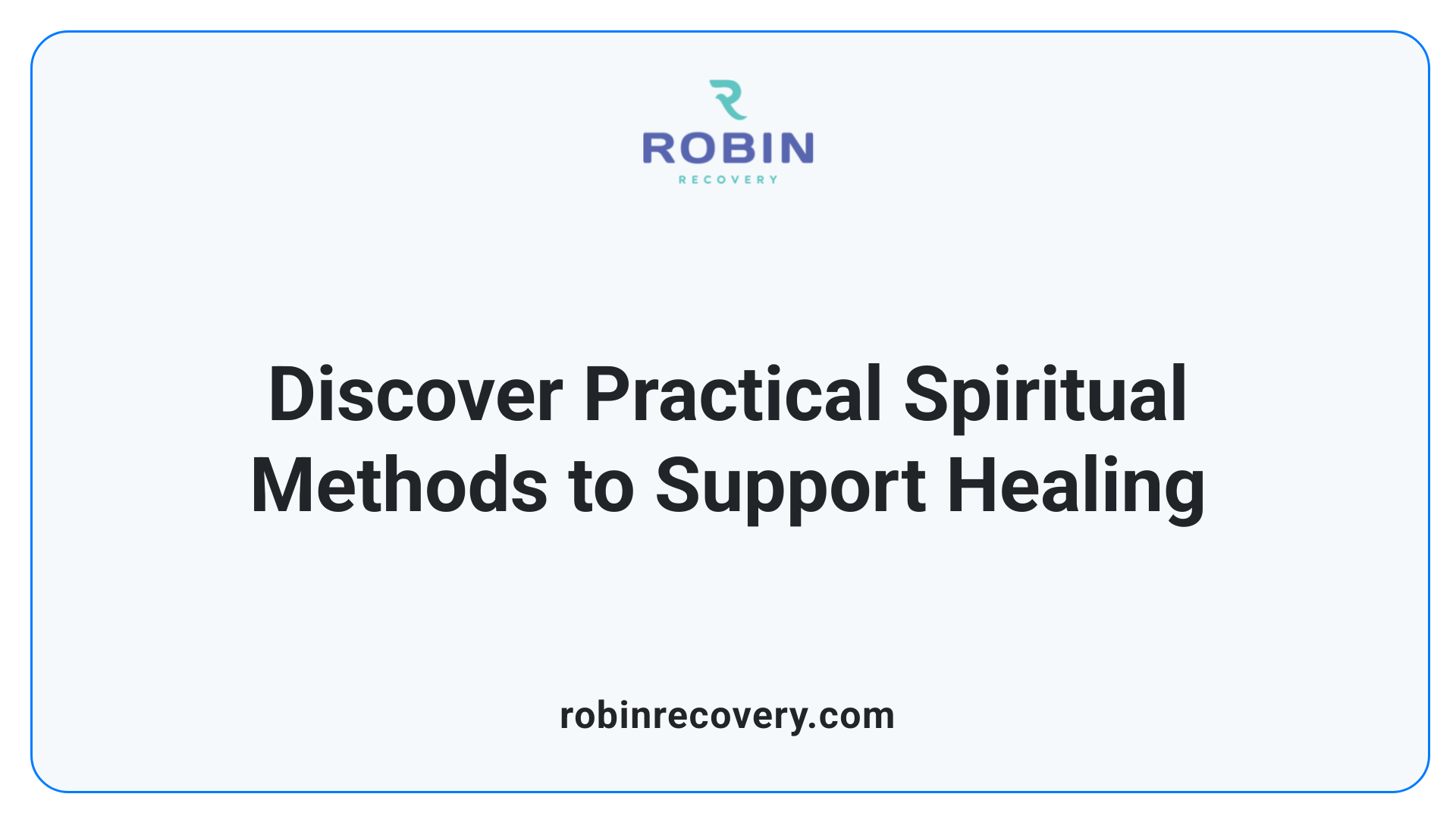Understanding the Role of Spirituality in Recovery
Exploring spirituality during recovery offers a transformative approach that addresses the emotional, psychological, and spiritual facets of healing from addiction. Rooted in personal belief, mindfulness, and community, spiritual practices serve as powerful tools to support individuals on their journey toward sustained sobriety, purpose, and well-being.
Why Spirituality is Fundamental to Recovery Success

Why is spirituality considered important in recovery?
Spirituality plays a vital role in addiction recovery because it offers a pathway to rediscover purpose and meaning in life. Many individuals struggling with addiction experience feelings of disconnection, shame, or loss. Embracing spirituality can help heal these wounds by fostering a sense of belonging and connection to something greater than oneself, such as nature, the universe, or a divine presence.
Engaging in spiritual practices like prayer, meditation, or simply spending time in nature encourages mindfulness—the ability to live in the present moment. This mindfulness is crucial in managing cravings and emotional triggers, reducing the likelihood of relapse. It also promotes emotional stability by providing a sense of inner peace and resilience against stress.
A strong spiritual connection often involves trusting in a Higher Power, which can serve as a source of hope and guidance amid recovery challenges. Such a connection encourages humility and accountability, motivating individuals to take responsibility for their actions and commitments to sobriety.
Moreover, spirituality can enhance social bonds through participation in faith-based or spiritual communities. These groups offer support, understanding, and shared purpose, which helps combat feelings of isolation often associated with addiction.
Ultimately, incorporating spirituality into recovery addresses all facets of well-being—mental, emotional, physical, and spiritual—fostering a holistic healing process. This comprehensive approach increases the likelihood of lasting sobriety and personal fulfillment.
How spiritual practices foster mindfulness and emotional stability
Practices such as meditation, gratitude journaling, and mindful reflection help individuals become more aware of their thoughts and feelings. By focusing on gratitude, people can shift their attention to positive aspects of life, which strengthen optimism and emotional resilience.
Meditation and deep breathing exercises calm the nervous system, reducing stress and anxiety—common obstacles in early recovery. These practices cultivate a sense of inner calm, making it easier to navigate emotional ups and downs.
Activities like yoga and nature walks further reinforce mindfulness by connecting individuals with their bodies and the environment. This connection promotes a sense of serenity, grounding them in the present moment.
The role of connection, accountability, and humility
Connection is fundamental in recovery, whether through relationships with others or with a Higher Power. This sense of community offers emotional support, accountability, and a shared sense of purpose.
Humility often develops as individuals recognize their limitations and the need for external support, fostering a respectful and trusting relationship with spiritual guides or support groups. This humility can make it easier to accept help, forgive past mistakes, and remain committed to growth.
Participating in spiritual or faith-based groups often involves rituals, prayer, or service activities, which enhance personal accountability. Such practices remind individuals of their values and goals, reinforcing their commitment to a sober lifestyle.
| Aspect | Benefits | Additional Notes |
|---|---|---|
| Purpose & Meaning | Motivates ongoing sobriety | Found through spiritual growth and reflection |
| Mindfulness & Emotional Stability | Reduces stress, manages cravings | Supported by meditation, gratitude, nature activities |
| Connection & Accountability | Strengthens community ties, fosters humility | Achieved through support groups, prayer, service |
Spirituality can serve as a supportive backbone throughout recovery, helping individuals rebuild their lives with renewed purpose, inner peace, and a strong sense of belonging.
The Integration of Spirituality into Evidence-Based Recovery Programs

How does spirituality support addiction recovery and healing?
Spirituality plays an important role in helping individuals recover from addiction by fostering emotional resilience, hope, and a sense of meaningful purpose. Engaging in spiritual practices such as prayer, meditation, and mindfulness can significantly reduce stress and improve coping strategies, which are vital during the challenging early stages of recovery.
Many established recovery programs, including Alcoholics Anonymous (AA) and Celebrate Recovery, integrate spiritual principles deeply into their frameworks. These programs often emphasize the belief in a higher power or divine presence, which provides guidance, strength, and motivation for individuals committed to sobriety. For example, AA encourages surrendering to a higher power and trusting in that power's support to overcome addiction.
Spirituality also cultivates social support and community connection, helping individuals reconnect with others, forgive themselves and past mistakes, and develop a renewed sense of worth. These elements contribute to reducing feelings of shame and guilt, promoting forgiveness, and fostering personal growth.
Importantly, spirituality in recovery is flexible. It allows individuals to choose practices that align with their personal beliefs, whether religious or secular. Secular spiritual approaches emphasize connection with nature, the universe, or all living creatures, offering inclusive avenues for healing. Practices like gratitude journaling, spending time in nature, and engaging in community service can provide similar benefits.
Research further supports that cultivating a spiritual outlook can enhance long-term sobriety. Studies indicate that those experiencing a spiritual awakening during treatment often have higher remission rates, with a 2019 study showing 82% of individuals maintaining sobriety after such growth.
In conclusion, integrating spirituality into evidence-based recovery programs adds a vital dimension of hope, connection, and purpose, all of which can improve mental health outcomes and support lasting recovery.
Practicing Spirituality: Methods and Beliefs that Support Healing

What role do spiritual practices and beliefs play in recovery processes?
Spiritual practices and beliefs are fundamental in fostering a sense of inner peace and connection to something greater than oneself. During addiction recovery, these practices support personal growth, resilience, and emotional stability. Engaging in activities such as prayer, meditation, mindfulness, or connecting with nature helps individuals develop self-awareness and emotional regulation. Many find that these spiritual activities also nurture hope and purpose, which are essential in overcoming the challenges of recovery.
Connecting with a higher power, the universe, or all living creatures helps to cultivate a sense of belonging and community, often missing in addiction. This connection provides social support, accountability, and guidance, reinforcing commitment to sobriety. The belief in a divine presence or universal energy can also encourage forgiveness, healing from past wounds, and the rebuilding of self-esteem. Overall, spiritual beliefs and practices play a vital role in creating a holistic recovery process that nurtures mental, emotional, and spiritual well-being.
How can spirituality facilitate healing during recovery?
Spirituality significantly enhances healing by instilling hope, inner calm, and a sense of purpose. These elements are crucial when navigating stress and emotional hurdles during recovery. Practices like prayer, meditation, and mindfulness cultivate self-awareness, helping individuals understand and manage their internal experiences better.
Connecting with a higher power or being part of a spiritual community provides external social support and accountability, which can motivate ongoing sobriety. These connections offer guidance, reassurance, and shared purpose, making the recovery journey less isolating.
Moreover, spirituality encourages forgiveness and reconciliation, allowing individuals to heal wounds from their past—whether self-inflicted or caused by others. This process boosts self-esteem and fosters emotional resilience.
By integrating these spiritual elements, recovery becomes more than just abstaining from substances; it becomes a journey of holistic healing that addresses emotional, psychological, and spiritual dimensions. The result often includes stronger resilience and a greater sense of well-being that supports long-term sobriety.
The Profound Benefits of a Spiritual Journey in Recovery

What are the benefits of a spiritual journey in recovery?
A spiritual journey in recovery offers many valuable benefits that support individuals through their healing process. Primarily, it helps individuals discover a sense of purpose and meaning that extends beyond their addiction struggles. This new perspective can serve as a foundation for building a hopeful outlook and a future rooted in growth.
Practicing spirituality often involves self-reflection and personal growth. These practices, such as meditation, prayer, or gratitude exercises, nurture self-awareness and emotional resilience, helping people understand their inner selves better and develop healthier coping mechanisms.
Connecting with community and support systems is another key aspect. Spirituality frequently encourages engagement with others who share similar beliefs or values, fostering a sense of belonging and reducing feelings of disconnection and isolation common in recovery journeys.
Moreover, spirituality can significantly diminish feelings of shame and disconnection. It promotes forgiveness—both self-forgiveness and forgiving others—and cultivates compassion. These elements are crucial in healing emotional wounds and rebuilding trust in oneself and others.
Research underscores these benefits, with studies showing that individuals involved in spiritual practices during recovery report higher resilience, lower anxiety, and greater life satisfaction. Spirituality thus acts as a powerful complement to traditional treatment methods, resulting in more holistic healing.
In summary, embracing a spiritual path can transform the recovery experience. It provides comfort during hardships, encourages meaningful self-exploration, strengthens community bonds, and heals emotional and spiritual wounds—making it an integral part of lasting recovery.
Sustaining Sobriety Through Spiritual Practices and Support

How does spirituality support long-term sobriety?
Spirituality plays a significant role in maintaining sobriety over the long term by offering a sense of purpose, meaning, and connection that extends beyond oneself. Many individuals find that engaging in spiritual practices such as prayer, meditation, or participating in faith-based or secular spiritual groups strengthens their emotional resilience and provides ongoing motivation to stay sober.
This sense of connection helps reduce feelings of isolation and shame, common challenges during recovery. For example, 12-step programs like Alcoholics Anonymous incorporate spiritual elements that encourage surrendering to a higher power, fostering accountability, hope, and community support.
Research supports these benefits: a 2019 study found that 82% of those experiencing a spiritual awakening during treatment remained abstinent after one year, compared to 55% who did not have such an experience. Spirituality not only boosts life satisfaction but also enhances positive coping strategies and buffers stress.
By fostering a supportive environment rooted in spiritual or personal values, individuals can nurture resilience. This inner strength helps them navigate challenges, resist relapse, and build a fulfilling life beyond addiction. In essence, spirituality encourages continuous growth, deepened social bonds, and a lasting sense of purpose—all crucial for sustaining sobriety over the long haul.
The Power of the Spirit in Healing and Growth
Incorporating spirituality into recovery is not a one-size-fits-all approach but a highly personal journey that can significantly enhance healing and resilience. Whether through rituals, community involvement, or personal reflection, spiritual practices foster hope, connection, and purpose, which are crucial for overcoming addiction and maintaining sobriety. Embracing one’s spiritual path offers a profound opportunity for holistic healing, empowering individuals to rebuild their lives with renewed strength, compassion, and clarity.
References
- 5 Benefits of Finding & Practicing Spirituality in Addiction ...
- 5 Ways Spirituality Boosts Addiction Recovery
- The Role of Social Supports, Spirituality, Religiousness ...
- The Role of Faith in Addiction Recovery: How Spirituality ...
- How Can a Spiritual Path Help in Recovery?
- The Benefits of Spirituality in Recovery
- The Importance of Spirituality in Recovery
- What Role Does Spirituality Play in Addiction Recovery?

.svg)

.svg)

.svg)
.svg)





































































































